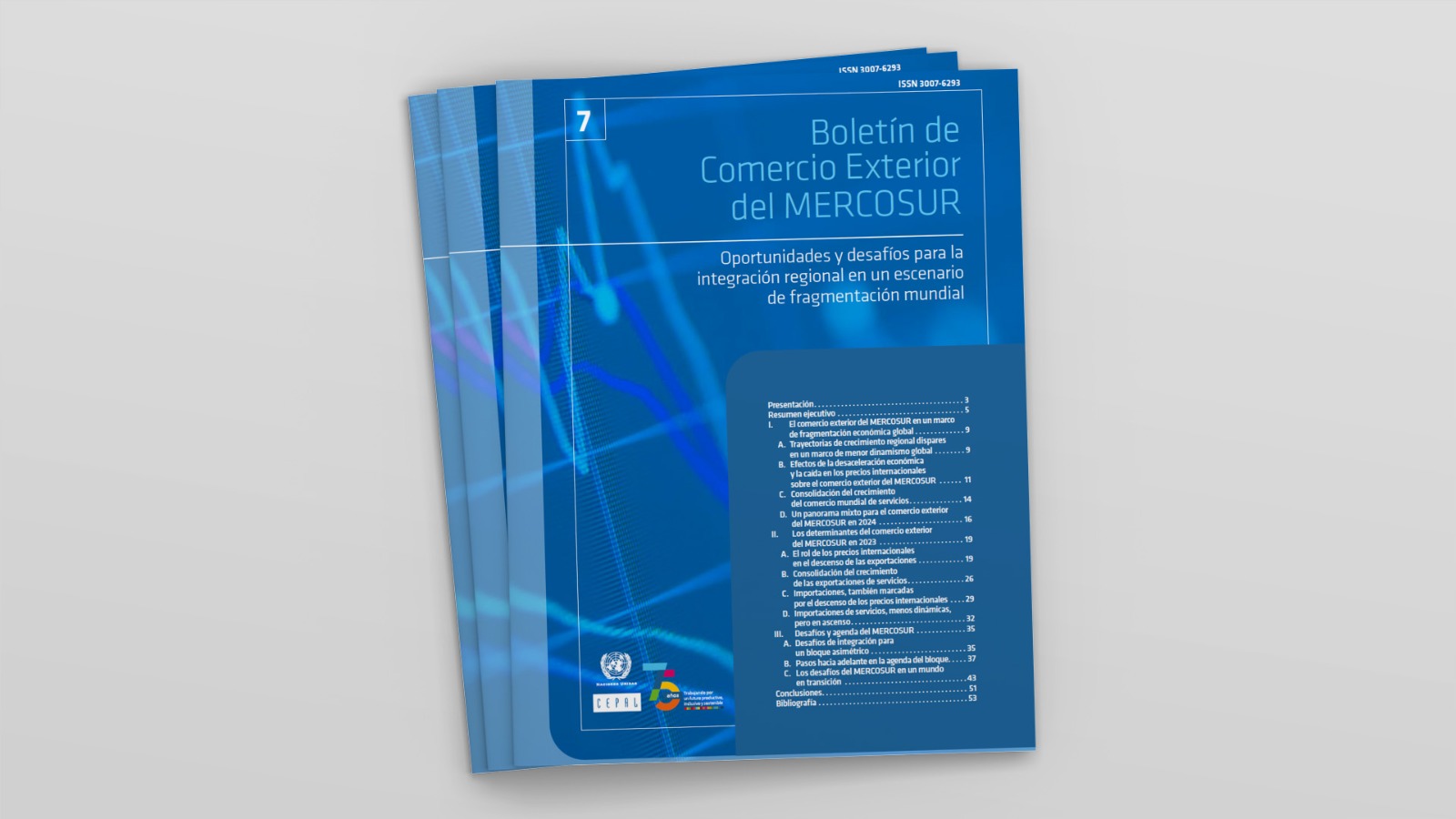Exports Between MERCOSUR Countries Showed Resilience Amid a Fall in the Rest of the Bloc’s Sales Abroad
Work area(s)
A new edition of the bloc’s Foreign Trade Bulletin, prepared by ECLAC, indicates that the challenges for 2024 will be linked to low dynamism in global demand and the downward trend in prices, amid persistently high interest rates.

Exports of goods from the Southern Common Market (MERCOSUR) fell by 4.1% in 2023, driven by a 7.2% drop in international prices for the exported goods, the Economic Commission for Latin America and the Caribbean (ECLAC) indicates in a new document. This occurred in the context of normalization of the international supply of goods after the COVID-19 pandemic and the start of the conflict between the Russian Federation and Ukraine, and it was offset by a 3.2% rise in volume attributable to improved agricultural harvests in Brazil and Paraguay.
A new edition of the Foreign Trade Bulletin of MERCOSUR (No. 7): Opportunities and Challenges for Regional Integration in a Scenario of Global Fragmentation (in Spanish only) – produced jointly by ECLAC’s Offices in Argentina, Brazil and Uruguay and the organization’s Division of International Trade and Integration – notes that growth in economic activity in MERCOSUR decelerated to 1.8% in 2023, from 5.0% the year before, which surpassed the slowdown experienced by the global economy.
According to the United Nations regional organization, the amount imported by the bloc also fell significantly last year. The value of imports decreased by 11.7% overall, due to a 9.5% drop in the imported goods’ international prices – driven by lower fuel and fertilizer costs – and a 2.4% decline in the volume of purchases from abroad.
“The value of trade between MERCOSUR members showed greater resilience than total trade, notching growth of 4.2% versus the prior year. This increase was facilitated by dynamism in the manufacturing sector, particularly the automotive sector. In addition, the bloc showed the ability to confront the exogenous shock entailed by a drought in Argentina and Uruguay on certain value chains by ensuring the supply of inputs from the bloc’s other members,” the document emphasizes.
According to the publication, foreign trade in services showed greater dynamism than that of goods, in line with global trends, surpassing pre-pandemic levels. Exports rose 12.8% from the prior year driven by inbound tourism and modern services, while imports increased by 4.6% due fundamentally to a decline in international prices for the transportation of goods, which offset strong growth in outbound tourism.
As a result, the balance of services – which structurally is a deficit for the bloc – shrank to 1.5% of the group’s GDP. With a goods trade surplus amounting to 2.7% of GDP, which exceeded the deficit in services, the total trade balance was positive at 1.2% of GDP. This marked an improvement over 2022, when the trade balance was essentially flat.
In 2024, ECLAC foresees significant challenges associated with low dynamism in global demand, the downward trend in international prices for the products exported by the bloc, and the persistence of high benchmark interest rates. The fact that Argentina and Uruguay have more to export after the drought works in favor of the group’s exports, although this will be offset by a drop in exportable supplies from Brazil. Imports could decline if the downward trend in hydrocarbons prices continues, although the conflicts in the Red Sea region could keep affecting global trade routes and push up shipping costs.
The UN regional economic commission stresses that after several years of little dynamism in the bloc’s functioning, important steps were taken in 2023, including Bolivia’s incorporation as a full member, the approval of a new set of rules of origin, the regularization of contributions to the MERCOSUR Structural Convergence Fund (FOCEM), and the signing of a trade agreement with Singapore. In contrast, beyond exchanging positions, no other progress has been made on negotiating a free-trade agreement with the European Union.
Beyond these advances, and in line with previous editions of this Bulletin, the document warns that MERCOSUR continues to have difficulties increasing its exports – which have grown less than global trade (2.2% per year versus 2.6%) since the end of the 2008-2009 international financial crisis – in a context of growing primarization of exports and difficulties for furthering regional integration.
Growing global geopolitical instability, the move by many countries in the world to “shorten” their supply chains to ensure that their economies have greater resilience to disruptive events, and the rising number of trade protection measures – including those that originate with environmental protection – could limit MERCOSUR’s possibilities for expanding its most traditional exports and could deepen the bloc’s lag in production, affecting its international integration.
The organization warns that the green transition represents another major challenge for MERCOSUR’s global integration. In addition to the risks imposed by increasingly frequent extreme climate conditions, which threaten to affect export supply, there is also a “green protectionism” being carried out by developed countries and their major policies to stimulate the transition to green economies. Thus, MERCOSUR countries face the difficult task of implementing green productive development policies with economic, social and environmental sustainability.
While recognizing these challenges, the bulletin also affirms that they represent a new opportunity to establish closer regional ties and create productive, technological and demand-related synergies, emulating the experiences of advanced economies. Successfully achieving that goal will depend to a considerable extent on the support of developed countries, given the significant disparity in efforts that currently exists.
Related content
Subregional headquarter(s) and office(s)
National Office, ArgentinaType
Country(ies)
- Latin America